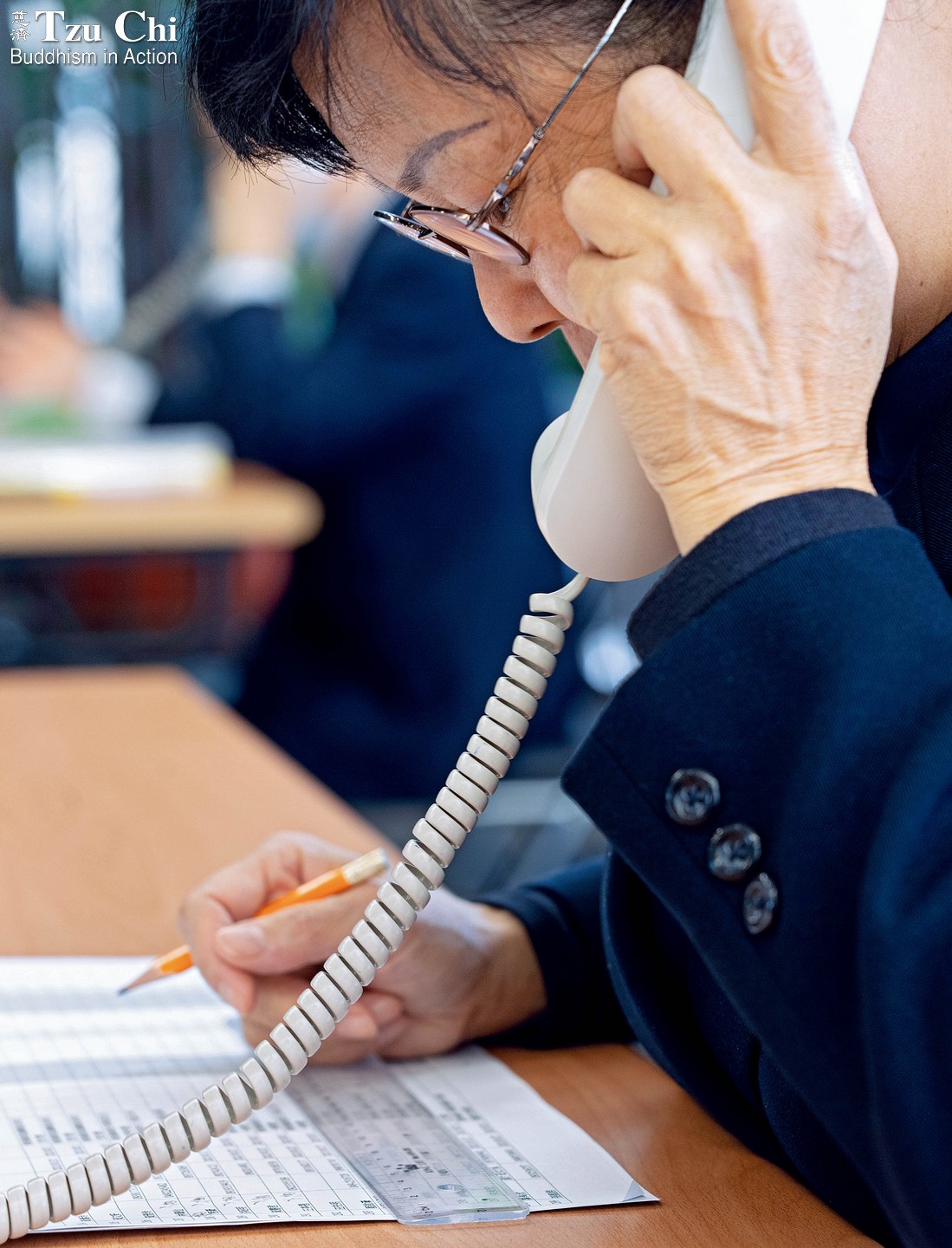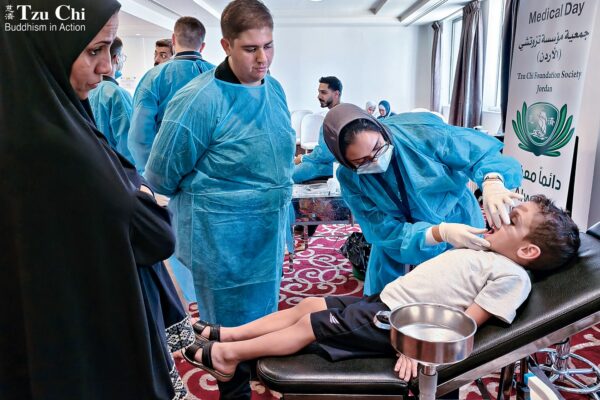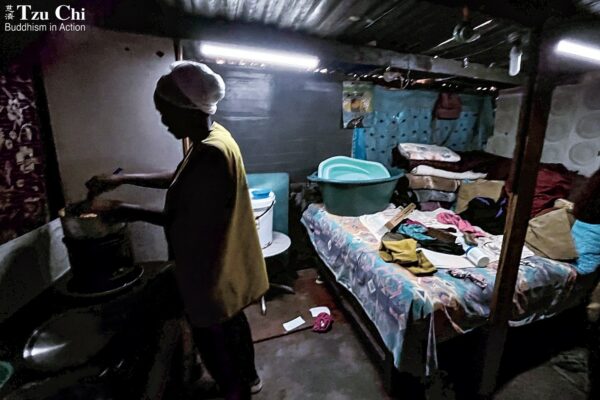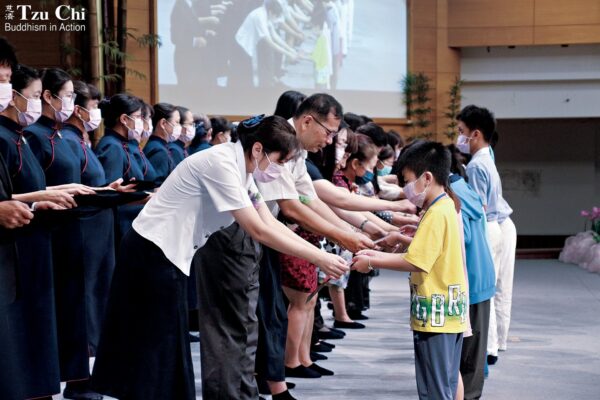By Leong Imm Chon
Translated by Wu Hsiao-ting
Photo by Hsiao Yiu-hwa
We had to suspend our home visits to the needy after Taiwan elevated its COVID-19 alert to level three. In their place, we launched care calls to continue providing support to the vulnerable. We learned in the process how a simple phone call can make a big difference to people struggling during the pandemic.

When home visits to the needy had to be suspended on account of the pandemic, Tzu Chi volunteers and social workers turned to calling the underserved to extend care and aid.
“Hello, I’m a volunteer/social worker from the Tzu Chi Foundation. I’m calling to check whether your life has been affected by the pandemic. How have you been doing? Is there anything we can do for you?”
After a level three pandemic alert was expanded to the entire island of Taiwan on May 19, 2021, we Tzu Chi members had to put our home visits to the underserved on hold. Instead, we immediately adjusted our modes of care delivery and began phoning families under our long-term care to determine how Tzu Chi could help them during this challenging time. We’ve averaged more than a thousand calls a week in Yilan, Hualien, and Taitung alone. A call might last anywhere from 30 minutes to two hours, as we listen carefully to the families pour out their hearts to us or share with us the problems they have encountered during this difficult time.
I work in the Tzu Chi Department of Charity Mission Development in Hualien. One day, I noticed tears in the eyes of my colleague Xu, a social worker, after she had finished one such care call. She had been talking for two hours. I knew she must have been very thirsty, so I handed her a glass of water. She gulped it down, then said, “It’s a good thing I made that call. The mother I talked to was on the brink of a breakdown. My call appeared to be the breather she needed.”
The woman my colleague had spoken to, Lin, was a kindergarten teacher. She lived with her mom, who was in her 60s, and with her 15-year-old son, Jie. Jie’s grandmother helped care for him when his mother was at work, but it wasn’t easy. Jie, physically large and strong, was a hyperactive child with a propensity for violence. He often lashed out and hit his grandmother when his temper got the better of him. His violence was not confined to his family either. He once even gave a visiting social worker bruises by pinching her.
When a sudden spike in COVID-19 cases caused all schools in Taiwan to close in May, Lin experienced for the first time what it was like living with her son 24 hours a day. Jie became even more volatile without school to divert him. The lack of visits of his home care provider, suspended due to the pandemic, just made it worse. The boy became like a ticking time bomb, set to explode at any time. Lin and her mother suffered violence from him several times a day. Feeling utterly alone and helpless, Lin’s heart was full of despair. She was in a state of near hysteria when she received the phone call from my colleague. She said she felt like a drowning person who had just caught a piece of driftwood. The phone call and conversation reignited a spark of hope in her.
My colleague told me that she listened most of the time and just offered words of comfort during those two hours of “conversation” with the mother. Lin did most of the talking. At the end of the call, my colleague asked the mother what else Tzu Chi could do to help her. “We’re doing fine financially, so we do not need help in that area,” Lin replied. “All I ask is if you can call me a few times a week. Your phone call today saved me!” For quite a while after she hung up the phone, my coworker remained emotionally moved. She was happy she could “save” a mother, and perhaps even a family, by being a patient listener for just two short hours.
We can make a difference
On another day, I called Yong, a visually impaired care recipient in Ruisui, Hualien. Since he couldn’t go out to work during the pandemic, I was concerned about his finances and wanted to find out how he was getting by. When I asked him how he was getting along, he told me he was managing okay financially, but missed going to church. He also missed interacting with people. Even his home care provider wasn’t able to enter his home to clean it up—she could only deliver meals to him. He said listening to Master Cheng Yen’s Dharma talks was keeping him going.
“Did you hear anything you particularly liked?” I asked.
“The Master teaches us to do good, so I drop money into my coin bank every day to be used to help the needy. The bank is nearly full. When will you come to collect it?”
I told him that we wouldn’t be visiting him anytime soon because of the pandemic, but asked him to continue saving money in an empty container when his coin bank was full. Before I said goodbye, I asked if there was anything else we could do for him. He answered, “No. The only thing I want is for one of you people to call me every day for a chat.”
I put down the phone overwhelmed with emotion. What he wanted was so simple: just a simple phone call.
Looking out the window at the blue sky outside, I wondered when we will be able to stop wearing masks and return to our life before. I wondered when those of us in Tzu Chi will resume our regular visits to our care recipients. Because of the pandemic, the things we used to take for granted have become more precious now.
I looked at my colleagues around me. Every day, they answer calls on our help hotline or phone families receiving long-term support from Tzu Chi to check on them. Sometimes they get so busy they forget to drink water or go to the restroom. It’s impossible not to feel tired after working a day like that. And not only that, but it takes a lot of energy to handle others’ negative emotions while keeping their own minds clear and focused so that they can properly address the needs of the people they are talking to and help them solve their problems.
Every day, my coworkers and I repeat what might seem insignificant in others’ eyes—talking incessantly on the phones in front of our computers. Those who don’t understand our work might think that we are simply chatting our days away. They don’t know that every phone call requires sincerity, patience, and empathy. If we are not emotionally strong enough or lose sight of our aspirations to help others, we wouldn’t be able to keep making one phone call after another.
“You must take care too!” Another colleague told me this is what she most often hears from care recipients at the end of calls. She said words like those were like a blessing—they instilled strength in her and helped keep her going. “Lighting a lamp for someone else also brightens your path,” as a saying goes. When we extend care to others, we are often rewarded with their warmth. Such warmth brings us hope.
We are lucky, compared with those whose lives have been badly impacted by the pandemic and who receive care from us. We can still do work that helps others, and we are financially secure. The pandemic has furloughed many people or has greatly reduced the hours they can work. Some have even lost their jobs permanently. Schoolchildren can’t access online learning while their schools are closed because they lack the resources. All kinds of problems can crush a family or throw their lives into disarray.
I remember something that Master Cheng Yen once said on an occasion when volunteers were looking back on the charitable path of Tzu Chi and sharing what they had experienced along the way: “During the September 21 Earthquake or Typhoon Herb, the power of nature really hit home. We human beings are so small and insignificant in the face of such destructive power. But even though we are small and insignificant, we can still do great things and make a difference.”
As it is with nature, we might feel small and insignificant in the face of the ruthless COVID-19 pandemic. But as small and insignificant as we may be, we can still help others every day. Take my coworkers and me as an example. We can call needy families and check if they are doing okay. We can tell them they can turn to Tzu Chi for assistance any time they need a helping hand. We can let them know that we are here for them when the going gets tough. Despite being small and insignificant, we can be superheroes for others as we lovingly form a safety net, catching every falling family and seeing them through the critical time of the pandemic.
Faced with the severe challenge of the pandemic, we don’t need people with super powers. There lives in each of us a superhero capable of lending a hand to those in need.
Helping COVID Patients
Compiled by Ye You-hua
Translated by Wu Hsiao-ting
In a convenience store, a female customer browsed the shelves, picked out some items, then carried her selections up to the counter to pay. She was a social worker; instead of shopping for herself, she was picking up daily necessities for COVID patients who had checked into a hospital in a hurry, and had had no time to prepare things they would need for their hospitalization.
Wu Fang-qian (吳芳茜), director of the social services office at Taipei Tzu Chi Hospital, said that every social worker at the hospital had to take on dozens of additional patient cases when the number of COVID infections spiked in Taiwan in mid-May. “Caring for COVID-19 patients is very different from caring for other patients,” she pointed out.
Because COVID patients must be treated in isolation, social workers cannot talk to them face-to-face to understand and address their needs. They instead rely on messaging apps to talk and maintain contact with patients. Besides preparing daily necessities for patients during their hospitalization, social workers offer them emotional support, help connect them with government and private social welfare resources, and check on them after they’ve been discharged from the hospital. Such check-ups may last anywhere from a week up to a month following their hospital stay.
Social worker Yang Hui-yi (楊惠儀) recalled a middle-aged man who was admitted into Taipei Tzu Chi Hospital along with his father, who was in his 80s. Both had been diagnosed with the coronavirus. On the day he checked into the hospital, the son’s company told him that they would find someone to fill in for him at work, but not long after that, they sent quite a different message: “You don’t have to return to work.” Losing his job was hard enough, but wasn’t as bad as what came next: his father’s condition continued to deteriorate despite treatment. Eventually the older man succumbed to the disease.
According to law, his body was cremated within 24 hours. The son, still hospitalized with COVID, was unable to arrange for his funeral. He was filled with great sadness and regret at not being able to perform this last service for his dad. “He cried and blamed himself for failing to take better care of his father,” Yang said. “He regretting letting his father go out to shop for groceries [thus exposing himself to risks of COVID infection].”
Knowing that he had been dismissed by his company, Yang talked several times with the son about his future arrangements. After 14 days of treatment, the man recovered and prepared to leave the hospital. “I have only a few hundred New Taiwan dollars on me—not even enough to pay my taxi fare,” he said to Yang. “What should I do?” Yang comforted him and helped him apply to the Tzu Chi Foundation for emergency financial aid and daily supplies.
On the day the man stepped out of the COVID care ward, a nurse walked towards him holding a care package and a gift pack from Tzu Chi. The packages contained enough food to last him for a month. The man’s eyes filled up with tears as he gratefully accepted the gifts
Many people have lost their jobs or, worse, their family due to the pandemic. Some people continue to face challenges even after they have recovered from the infection and are discharged from the hospital. Social worker Lin Jia-de (林家德) said that many recovered COVID patients worry that people around them might discriminate against them. Should they lose their jobs, their lives would become even more difficult. “For this reason, it is important to connect them with financial aid offered by the government or private sectors if they need such assistance,” Lin explained. “At the very least, we must help them get by during their quarantine period at home.”
These COVID patients, from the time they were admitted into Taipei Tzu Chi Hospital until they were discharged, never got to meet the social workers who helped care for them. But their hearts, weighed down by their illness and all that went with it, were greatly soothed due to the help of these social workers.



